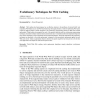Free Online Productivity Tools
i2Speak
i2Symbol
i2OCR
iTex2Img
iWeb2Print
iWeb2Shot
i2Type
iPdf2Split
iPdf2Merge
i2Bopomofo
i2Arabic
i2Style
i2Image
i2PDF
iLatex2Rtf
Sci2ools
126
click to vote
DPD
2002
2002
Evolutionary Techniques for Web Caching
Web caching has been proposed as an effective solution to the problems of network traffic and congestion, Web objects access and Web load balancing. This paper presents a model for optimizing Web cache content by applying either a genetic algorithm or an evolutionary programming scheme for Web cache content replacement. Three policies are proposed for each of the genetic algorithm and the evolutionary programming techniques, in relation to objects staleness factors and retrieval rates. A simulation model is developed and long term trace-driven simulation is used to experiment on the proposed techniques. The results indicate that all evolutionary techniques are beneficial to the cache replacement, compared to the conventional replacement applied in most Web cache server. Under an appropriate objective function the genetic algorithm has been proven to be the best of all approaches with respect to cache hit and byte hit ratios.
Related Content
| Added | 18 Dec 2010 |
| Updated | 18 Dec 2010 |
| Type | Journal |
| Year | 2002 |
| Where | DPD |
| Authors | Athena Vakali |
Comments (0)

